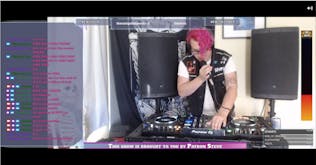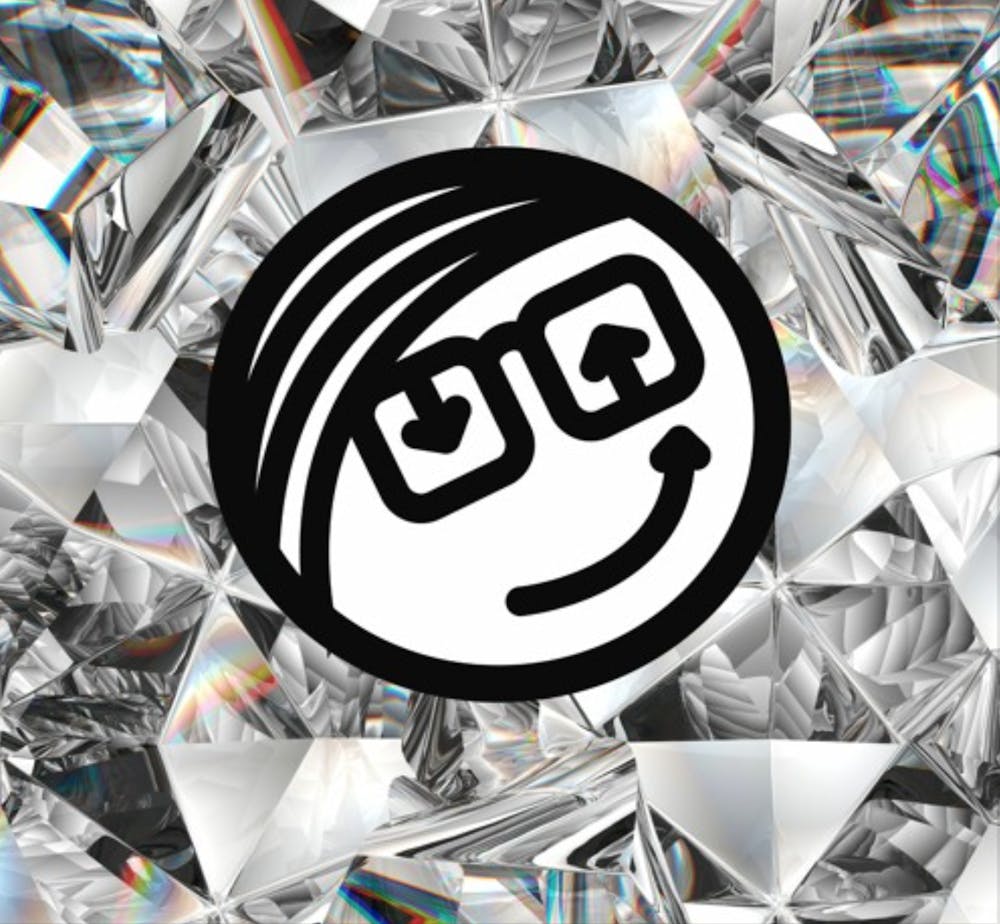When Bill Boulden was a kid, they dreamed of embarking upon a world tour or winning a Grammy.
But Boulden, a 2006 UB graduate, soon realized this life is not all that it is hyped up to be.
As they grew older, a new goal came into focus: perfecting their craft. After attending night school for music production, learning the ropes as a club DJ in casinos and breaking with their older, less professional tracks, Downupright was born.
The name Downupright has multiple meanings: First, Boulden has remixed Super Nintendo Entertainment System songs, offering a “video gamey” style of music to match the name. Second, Downupright is a nod to Boulden’s lifelong struggles with mental illness: “I’m always down or up. But I try to stay downright upright no matter if I’m down or up.”
During the day, Boulden, 36, works as the acting chief engineer for Use Kitch, Hello Audio and Connector Street. But, in their free time, “I’m always making EDM,” Boulden says.

Boulden makes what they call “High Energy EDM,” a genre similar to electro house (think Flux Pavillion or Deadmau5). They have released 23 songs since March 2020 and are on track to release a six-song EP this year, including songs like “Crusty,” which features a shredding, repetitive melody and an acoustic arpeggiated piano chord progression that is unified through a stomping backbeat. Their favorite project,“All My Dreams Are Nightmares,” combines a slow, deep bass with a spacious synthesizer. To tie it together, vocals shine through from Fiverr collaborator, Valentina Lela.
“Normally EDM has very produced, polished auto-tune vocals, but she’s a jazz singer at heart. I let her do her thing and that’s part of why it sounds so different, I left the vocal track very natural and untuned,” Boulden said.
Back in the early 2010s, dance music reached its peak, as it profoundly influenced the pop genre — and vice versa. Songs like David Guetta’s “Titanium,” Calvin Harris’ “Sweet Nothing” and Avicii’s “Levels” were radio staples and brought EDM into the mainstream. But despite its seemingly unhindered growth , its popularity declined with time. Still, its influence continues to linger. To this day, artists sample elements of dance music, and new subgenres have since matured and developed.
In 2006, Boulden graduated UB with degrees in musical composition and computer science.
“Studying music at UB was a dozen times harder than my CS degree, but a dozen times more rewarding,” Boulden said. “Baird [Hall] is different because every room has a piano or is acoustically treated — so it can’t just be the same place they teach any old class. It made you closely identify with the building.”
From their perspective, Baird Hall became a “home base” of sorts where Boulden could take a nap, practice for hours or watch their friends perform. In their time at UB, Boulden wrote a string quartet and a symphony. Boulden fondly remembers the instruction of Jonathan Golove, an associate professor and department chair who “was very keyed into my curiosity about EDM.” Boulden recalls how Golove helped them appreciate the tradition of classical music composition while “still letting me live my own truth.”
In the years that followed, this truth took many forms but followed the same path of creating and mixing dance music. Currently, Boulden live streams on Twitch under the Downupright name about once a week.
“It’s very collaborative. Most people work and my audience is pretty small… I’m usually streaming to about five people,” Boulden said.
Viewers get to see dance music come to life note by note and participate in Boulden’s music creation process by leaving comments.
“They’ll type in the chat and be like, ‘Yo, that is a dope sound’... [Recently,] somebody proposed getting dirty with the FM knob and I’m like, ‘Oh, that’s a great idea,’” Boulden said. “I took it and the result was a lot of fun. It’s nice to be that involved back and forth.”
Downupright also spins house music sets live on Twitch as another way to connect with its audience, with a recent stream donating funds to the Trans Lifeline.
As a 13-year-old composer, Boulden grew up surrounded by the sounds of electronic groups like The Chemical Brothers, Moby, Fatboy Slim and The Prodigy. The advent of software programs designed to create electronic music, called Digital Audio Workspaces (DAWs), gave novice and experienced musicians alike the ability to turn a MIDI keyboard into any instrument imaginable. These programs opened the door to a new era of musical composition, as artists now had the ability to edit and create a more diverse range of sounds.
In the late ’90s, Boulden says, it was difficult to become famous or recognized as a producer alone.
“As a kid, things were still dominated by bands, or like iconic faces,” Boulden said. “I only knew how to use this DAW, and I used to dream [that] one day there will be a way where someone can be famous just for making the music and they don’t have to be the one who sings it good, or has the pretty face on it, or be part of a band that plays guitars, because I can’t do any of those things.”
It is this philosophy that informs the idea that music created on a computer is real music, too.
“It’s not about how fast your fingers are or how blessed your voice is: You can do what anyone else does,” Boulden said. “And that’s really powerful. So the art is in the execution.”
From 2015-18, Boulden was a professional club DJ. That period helped them realize that music isn’t only about the singer; it’s primarily about the listener.
“I always had the idea that music and performance is about expressing yourself… ultimately, I think a lesson that I learned underneath it all, it wasn’t obvious to me at first, is that you have to do something for a listener,” Boulden said. “People turn to music to fill roles in their life: they’re driving, they’re working out, they’re at the club — and you need to meet that person where they’re at and say: ‘I have this for you right now.’ I’m not just there to express myself anymore, I’m there to serve.”
What Boulden points to is that, unlike other music genres that focus mainly on storytelling, EDM seems like a “contest of execution to see what you can pull off.” Every song is an opportunity for artists to surprise listeners with new synthesizers, rhythms, production methods or filters. After seeing the industry and medium change so much through the years, Downupright’s goal is simple: “I don’t want to be Skrillex...I just want to make my music and make it well.”
In the future, Boulden hopes to create a Spotify Original or make a noteworthy playlist or a famous DJ’s set.
“Downupright looks to get back into house music club nights and spinning around Buffalo once nightlife resumes,” Boulden said. “When the world comes back look for me to make appearances at local venues spinning high-energy house.”
Jack Porcari is an assistant features editor and can be reached at jack.porcari@ubspectrum.com

Jack Porcari is a senior news/features editor at The Spectrum. He is a political science major with a minor in journalism. Aside from writing and editing, he enjoys playing piano, flow arts, reptiles and activism.





